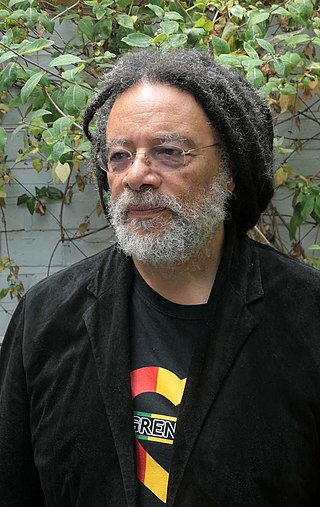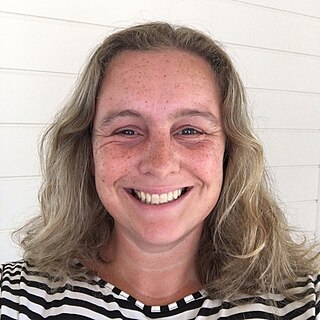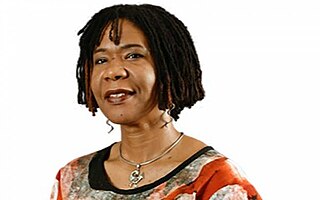
Dub poetry is a form of performance poetry of Jamaican origin, which evolved out of dub music in Kingston, Jamaica, in the 1970s, as well as in London, England, and Toronto, Canada, cities which have large populations of Caribbean immigrants. The term "Dub Poetry" was coined by Dub artist Linton Kwesi Johnson in 1976, and further popularized by artist Oku Onoura, which consists of spoken word over reggae rhythms, originally found on the backing or "version" side of a 12 or 7 inch vinyl record.

Catherine Hall is a British academic. She is Emerita Professor of Modern British Social and Cultural History at University College London and chair of its digital scholarship project, the Centre for the Study of the Legacies of British Slavery. Her work as a feminist historian focuses on the 18th and 19th centuries, and the themes of gender, class, race and empire.

Paul Gilroy is an English sociologist and cultural studies scholar who is the founding Director of the Sarah Parker Remond Centre for the Study of Race and Racism at University College London (UCL). Gilroy is the 2019 winner of the €660,000 Holberg Prize, for "his outstanding contributions to a number of academic fields, including cultural studies, critical race studies, sociology, history, anthropology and African-American studies".
The history of external colonisation of Africa can be dated back from ancient, medieval, or modern history, depending on how the term colonisation is defined.
Andrew Sluyter is an American social scientist who currently teaches as a professor in the Geography and Anthropology Department of the Louisiana State University in Baton Rouge. His interests are the environmental history and historical, cultural, and political ecology of the colonization of the Americas. He has made various contributions to the theorization of colonialism and landscape, the critique of neo-environmental determinism, to understanding pre-colonial and colonial agriculture and environmental change in Mexico, to revealing African contributions to establishing cattle ranching in the Americas, and to the historical geographies of Hispanics and Latinos in New Orleans. With the publication of Black Ranching Frontiers: African Cattle Herders of the Atlantic World, 1500–1900 and a 2012–13 Digital Innovation Fellowship from the American Council of Learned Societies, he has joined a growing number of scholars from multiple disciplines working from the perspective of Atlantic History and using the tools of the Digital Humanities. His latest book, Hispanic and Latino New Orleans: Immigration and Identity since the Eighteenth Century, co-authored with Case Watkins, James Chaney, and Annie M. Gibson, was awarded the 2015 John Brinckerhoff Jackson Book Prize by the American Association of Geographers.

The Empire Writes Back: Theory and Practice in Post-Colonial Literatures is a 1989 non-fiction book on postcolonialism, penned by Bill Ashcroft, Gareth Griffiths and Helen Tiffin. The Empire Writes Back was the first major theoretical account of a wide range of postcolonial texts and their relationship with bigger issues of postcolonial culture, and is said to be one of the most significant and important works published in the field of postcolonialism. The writers debate on the relationships within postcolonial works, study the mighty forces acting on words in the postcolonial text, and prove how these texts constitute a radical critique of Eurocentric notions of language and literature. First released in 1989, this book had a second edition published in 2002.
Heidi Safia Mirza is a British academic, who is Professor of Race, Faith and Culture at Goldsmiths, University of London, Professor Emerita in Equalities Studies at the UCL Institute of Education, and Visiting Professor in Social Policy at the London School of Economics (LSE). She has done pioneering research on race, gender and identity in education, multiculturalism, Islamophobia and gendered violence, and was one of the first black women professors in Britain. She is author and editor of several notable books, including Young, Female and Black (1992), Black British Feminism (1997), Tackling the Roots of Racism: Lessons for Success (2005), Race Gender and Educational Desire: Why Black Women Succeed and Fail (2009), Black and Postcolonial Feminisms in New Times (2012), and Respecting Difference: Race, Faith, and Culture for Teacher Educators (2012).

Priyamvada Gopal is an Indian-born academic, writer and public intellectual who is Professor of Postcolonial Studies at the University of Cambridge. Her primary teaching and research interests are in colonial and postcolonial studies, South Asian literature, critical race studies, and the politics and cultures of empire and globalisation. She has written three books engaging these subjects: Literary Radicalism in India (2005), The Indian English Novel (2009) and Insurgent Empire (2019). Her third book, Insurgent Empire, was shortlisted for the 2020 Nayef Al-Rodhan Prize for Global Cultural Understanding.
Lidia van Driel-Gesztelyi is a Hungarian solar scientist and professor of physics at the Mullard Space Science Laboratory of University College London. She also maintains affiliations with Solar and Stellar Activity Research Team at Konkoly Observatory of the Hungarian Academy of Sciences and the Space Research Laboratory (LESIA) of Paris Observatory. She has been Editor-in-Chief of the journal Solar Physics since 2005 and has served in leadership roles within the International Astronomical Union.
Christine Susan Betham Grimmond is a New Zealand scientist and professor of urban meteorology at the University of Reading. She currently holds the post of Met Office Joint Chair. Grimmond is a pioneer of the fields of urban meteorology and micrometerology, which deal with the atmospheric boundary layer.
Shamshad Cockcroft is a British physiologist and a professor of cell physiology in the Neuro, Physiology and Pharmacology Division of Biosciences at the UCL. She has been a member of The Physiological Society since 1989.

Jenny Pickerill is a Professor of Environmental Geography and Head of Department at the University of Sheffield. Her work considers how people value and use the environment, the impact of social justice on environmental policy and establishing ways to change social practise.

Farhana Sultana is a Full Professor of Geography at Syracuse University, where she is also a Research Director for the Program on Environmental Collaboration and Conflicts at the Maxwell School of Citizenship and Public Affairs. Her research considers how water management and climate change impact society. Her first book, The Right to Water: Politics, Governance and Social Struggles, investigates the relationships between human rights and access to clean water. She is a feminist political ecologist whose work focuses on climate justice, water governance, sustainability, international development, and decolonizing global frameworks.

Decolonization of knowledge is a concept advanced in decolonial scholarship that critiques the perceived hegemony of Western knowledge systems. It seeks to construct and legitimize other knowledge systems by exploring alternative epistemologies, ontologies and methodologies. It is also an intellectual project that aims to "disinfect" academic activities that are believed to have little connection with the objective pursuit of knowledge and truth. The presumption is that if curricula, theories, and knowledge are colonized, it means they have been partly influenced by political, economic, social and cultural considerations. The decolonial knowledge perspective covers a wide variety of subjects including philosophy, science, history of science, and other fundamental categories in social science.
Mayra Rivera is a scholar of religion who is the Andrew W. Mellon Professor of Religion and Latinx Studies at Harvard University.

Yarimar Bonilla is a Puerto Rican political anthropologist, author, columnist, and professor of anthropology and Puerto Rican studies at Hunter College and the Graduate Center of the City University of New York. As of 1 July 2023 she is a Professor at Princeton's Effron Center. Bonilla’s research questions the nature of sovereignty and relationships of citizenship and race across the Americas.

Sonjah Stanley Niaah is a Jamaican scholar, cultural activist, and writer. She is known for her work on dancehall, old and new Black Atlantic performance geographies, ritual, dance, festivals, cultural and creative industries, as well as popular culture and the sacred.
Patricia K. Quinn is a atmospheric chemist working at the National Oceanic and Atmospheric Agency's Pacific Marine Environmental Lab. She is known for her work on the impact of atmospheric aerosol particles on air quality and climate.

Agate Nesaule was a Latvian-born American writer and professor of English on the faculty of the University of Wisconsin–Whitewater. Her 1995 memoir A Woman in Amber won the American Book Award from the Before Columbus Foundation in 1996.

Elaine Stratford is an Australian cultural and political geographer, academic, and author. She is a professor of geography in the School of Geography, Planning, and Spatial Sciences in the College of Sciences and Engineering at the University of Tasmania.











